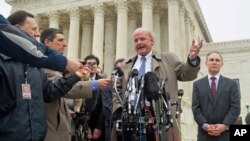A sharply divided U.S. Supreme Court heard oral arguments Wednesday in a challenge to President Barack Obama’s signature health care law. If the challenge is successful, it could lead to changes in the law that would affect millions of Americans who depend on government subsidies to help them buy health care coverage.
Hundreds of impassioned demonstrators on both sides of the issue chanted in front of the Supreme Court before, during and after the oral arguments before the nine justices as they took up this latest challenge to the divisive Obama health care law.
At issue are the subsidies that millions of low- to moderate-income Americans rely on to buy health insurance coverage under the Affordable Care Act.
Currently those wishing to buy health care are able to get subsidies either from individual state health care exchanges or from a federal program that is used by states that chose not to set up their own exchanges. Thirteen states and the District of Columbia have set up their own exchanges, while 34 states rely on a federal program.
But opponents of the law, which they prefer to call ‘Obamacare,” say the statute requires that subsidies should go to people who only buy them in marketplaces “established by the state.” If a majority of the high court accepts that standard, an estimated eight million people who have received subsidies through the federal program would be cut off and unable to afford health insurance.
Passions Run High
The case inspired strong emotions on the sidewalk in front of the Supreme Court. Martha Robinson told VOA that she traveled all the way from Indiana to be outside the high court. Robinson said if her subsidy is cut and she loses her health insurance, the health of her son, who suffers from Marfan syndrome, would be at risk.
“We have a subsidy without which we can’t afford health insurance and I can’t stand back and see my son be put in that position or the many other Americans whose lives are really dependent on the Affordable Care Act,” she said.
But opponents of the Obama health care law, including Tea Party supporters and conservative members of Congress, made impassioned pleas of their own. Michelle Mellon, a retired nurse from New Jersey, hopes the court will strike down a crucial part of a health care law she believes limits freedom.
“It’s personal for the people who are out here who don’t want their health care taken over, who don’t want our choices taken away and who don’t want someone telling us where we have to go, what we have to do and how much we have to pay,” she said.
Conservative Republican Congressman Ted Poe of Texas was among those who took to a podium in front of the Supreme Court steps in support of the legal challenge to the health care law. Poe said Obama is wrong to argue that the current law permits health exchanges run by the federal government.
“Most people learned in ninth grade that laws are made by Congress. Laws are not made by the executive,” he said.
Decision by June
In an interview with Reuters this week, Obama argued that the health care law is working and that millions of Americans now depend on it for health care coverage.
“And you know what, the thing is working exactly as intended, which is why we signed up 11 million people to go through these exchanges and we are seeing more competition, lower prices, more choice, more shopping among people than even I expected, even proponents of it expected,” he said.
Legal analysts see this latest challenge as a key test. The high court narrowly upheld the constitutionality of the health care law in a 2012 decision, thanks to the unexpected support of Chief Justice John Roberts. Roberts could play a key role in this decision as well, along with Justice Anthony Kennedy, the justice who most often finds himself in the middle between the court’s liberal and conservative factions.
Wednesday’s oral arguments revealed few hints as to how the nine justices view this latest case. A decision is expected before the end of June.





